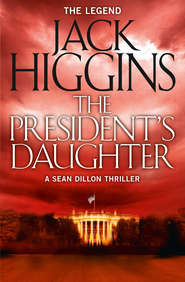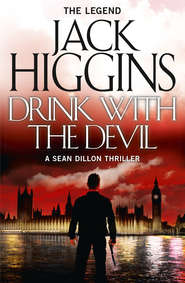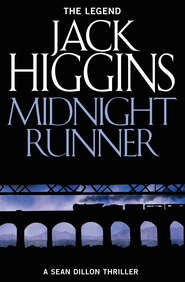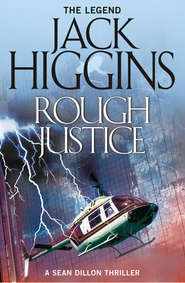По всем вопросам обращайтесь на: info@litportal.ru
(©) 2003-2024.
✖
Confessional
Автор
Год написания книги
2018
Настройки чтения
Размер шрифта
Высота строк
Поля
‘Good. Let’s see if they’re willing to show some sense for once. I want you to go to Dublin to see the PIRA Army Council or anyone they’re willing to delegate to see you. I’ll make the right phone calls to set it up. Stay at the Westbourne as usual. And I mean today, Harry. I’ll see to Levin.’
‘Right, sir,’ Fox said calmly. ‘Then if you’ll excuse me, I’ll get started,’ and he went out.
Ferguson went back to the window and looked out at the rain. Crazy, of course, the idea that British Intelligence and the IRA could work together and yet it made sense this time. The question was, would the wild men in Dublin see it that way?
Behind him, the study door opened and Levin appeared. He coughed apologetically, ‘Brigadier, do you still need me?’
‘But of course, my dear chap,’ Charles Ferguson said. ‘I’ll take you along to my headquarters now. Pictures – lots of pictures, I’m afraid.’ He picked up his coat and hat and opened the door to usher Levin out. ‘But who knows? You might just recognize our man.’
In his heart, he did not believe it for a moment, but he didn’t tell Levin that as they went down in the lift.
3 (#ulink_2c1ec9b9-4c94-54ee-bd5f-d688888a0244)
In Dublin, it was raining, driving across the Liffey in a soft grey curtain as the cab from the airport turned into a side street just off George’s Quay and deposited Fox at his hotel.
The Westbourne was a small old-fashioned place with only one bar-restaurant. It was a Georgian building and therefore listed against redevelopment. Inside however, it had been refurbished to a quiet elegance exactly in period. The clientele, when one saw them at all, were middle-class and distinctly ageing, the sort who’d been using it for years when up from the country for a few days. Fox had stayed there on numerous occasions, always under the name of Charles Hunt, profession, wine wholesaler, a subject he was sufficiently expert on to make an eminently suitable cover.
The receptionist, a plain young woman in a black suit, greeted him warmly. ‘Nice to see you again, Mr Hunt. I’ve managed you number three on the first floor. You’ve stayed there before.’
‘Fine,’ Fox said. ‘Messages?’
‘None, sir. How long will you be staying?’
‘One night, maybe two. I’ll let you know.’
The porter was an old man with the sad, wrinkled face of the truly disillusioned and very white hair. His green uniform was a little too large and Fox, as usual, felt slightly embarrassed when he took the bags.
‘How are you, Mr Ryan?’ he enquired as they went up in the small lift.
‘Fine, sir. Never better. I’m retiring next month. They’re putting me out to pasture.’
He led the way along the small corridor and Fox said, ‘That’s a pity. You’ll miss the Westbourne.’
‘I will so, sir. Thirty-eight years.’ He unlocked the bedroom door and led the way in. ‘Still, it comes to us all.’
It was a pleasant room with green damask walls, twin beds, a fake Adam fireplace and Georgian mahogany furniture. Ryan put the bag down on the bed and adjusted the curtains.
‘The bathroom’s been done since you were last here, sir. Very nice. Would you like some tea?’
‘Not right now, Mr Ryan.’ Fox took a five pound note from his wallet and passed it over. ‘If there’s a message, let me know straight away. If I’m not here, I’ll be in the bar.’
There was something in the old man’s eyes, just for a moment; then he smiled faintly. ‘I’ll find you, sir, never fear.’
That was the thing about Dublin these days, Fox told himself as he dropped his coat on the bed and went to the window. You could never be sure of anyone and there were sympathizers everywhere, of course. Not necessarily IRA, but thousands of ordinary, decent people who hated the violence and the bombing, but approved of the political ideal behind it all.
The phone rang and when he answered it, Ferguson was at the other end.
‘It’s all set. McGuiness is going to see you.’
‘When?’
‘They’ll let you know.’
The line went dead and Fox replaced the receiver. Martin McGuiness, Chief of Northern Command for the PIRA, amongst other things; at least he would be dealing with one of the more intelligent members of the Army Council.
He could see the Liffey at the far end of the street, and rain rattled against the window. He felt unaccountably depressed. Ireland, of course. For a moment, he felt a distinct ache in the left hand again, the hand that was no longer there. All in the mind, he told himself, and went downstairs to the bar.
It was deserted except for a young Italian barman. Fox ordered a Scotch and water and sat in a corner by the window. There was a choice of newspapers on the table and he was working his way through The Times when Ryan appeared like a shadow at his shoulder.
‘Your cab’s here, sir.’
Fox glanced up. ‘My cab? Oh, yes, of course.’ He frowned, noticing the blue raincoat across Ryan’s arm. ‘Isn’t that mine?’
‘I took the liberty of getting it for you from your room, sir. You’ll be needing it. This rain’s with us for a while yet, I think.’
Again, there was something in the eyes, almost amusement. Fox allowed him to help him on with the coat and followed him outside and down the steps to where a black taxicab waited.
Ryan opened the door for him and said, as Fox got in, ‘Have a nice afternoon, sir.’
The cab moved away quickly. The driver was a young man with dark, curly hair. He wore a brown leather jacket and white scarf. He didn’t say a word, simply turned into the traffic stream at the end of the street and drove along George’s Quay. A man in a cloth cap and reefer coat stood beside a green telephone box. The cab slid into the kerb, the man in the reefer coat opened the rear door and got in beside Fox smoothly.
‘On your way, Billy,’ he said to the driver and turned to Fox genially. ‘Jesus and Mary, but I thought I’d drown out there. Arms up, if you please, Captain. Not too much. Just enough.’ He searched Fox thoroughly and professionally and found nothing. He leaned back and lit a cigarette, then he took a pistol from his pocket and held it on his knee. ‘Know what this is, Captain?’
‘A Ceska, from the look of it,’ Fox said. ‘Silenced version the Czechs made a few years back.’
‘Full marks. Just remember I’ve got it when you’re talking to Mr McGuiness. As they say in the movies, one false move and you’re dead.’
They continued to follow the line of the river, the traffic heavy in the rain and finally pulled in at the kerb half-way along Victoria Quay.
‘Out!’ the man in the reefer coat said and Fox followed him. Rain drove across the river on the wind and he pulled up his collar against it. The man in the reefer coat passed under a tree and nodded towards a small public shelter beside the quay wall. ‘He doesn’t like to be kept waiting. He’s a busy man.’
He lit another cigarette and leaned against the tree and Fox moved along the pavement and went up the steps into the shelter. There was a man sitting on the bench in the corner reading a newspaper. He was well dressed, a fawn raincoat open revealing a well-cut suit of dark blue, white shirt and a blue and red striped tie. He was handsome enough with a mobile, intelligent mouth and blue eyes. Hard to believe that this rather pleasant-looking man had featured on the British Army’s most wanted list for almost thirteen years.
‘Ah, Captain Fox,’ Martin McGuiness said affably. ‘Nice to see you again.’
‘But we’ve never met,’ Fox said.
‘Derry, 1972,’ McGuiness told him. ‘You were a cornet, isn’t that what you call second lieutenants in the Blues and Royals? There was a bomb in a pub in Prior Street. You were on detachment with the Military Police at the time.’
‘Good God!’ Fox said. ‘I remember now.’
‘The whole street was ablaze. You ran into a house next to the grocer’s shop and brought out a woman and two kids. I was on the flat roof opposite with a man with an Armalite rifle who wanted to put a hole in your head. I wouldn’t let him. It didn’t seem right in the circumstances.’
For a moment, Fox felt rather cold. ‘You were in command in Derry for the IRA at that time.’
McGuiness grinned. ‘A funny old life, isn’t it? You shouldn’t really be here. Now then, what is it that old snake, Ferguson, wants you to discuss with me?’
So Fox told him.











